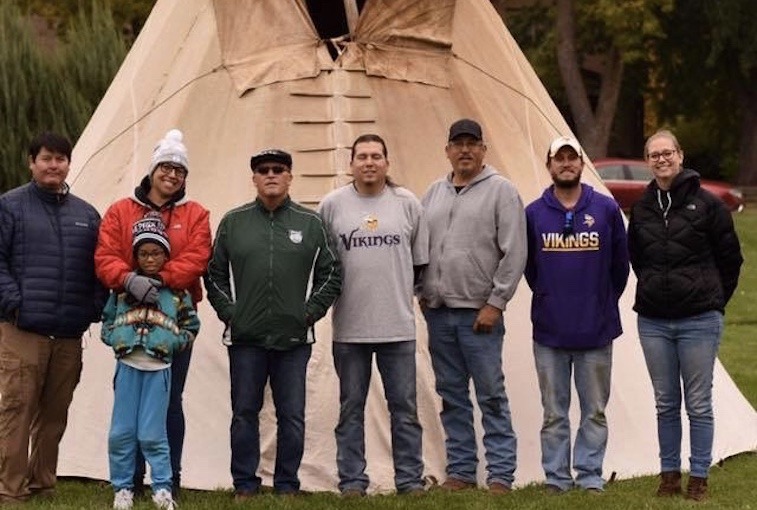A Sanford Health scientist has received a 2019 Bush Fellowship. Michaela Seiber, a senior research specialist in the health care organization’s research ethics and dissemination core, is one of 24 people chosen out of nearly 700 applicants from South Dakota, North Dakota, Minnesota and 23 Native American nations in those states.
The Bush Foundation supports leadership development for people with a plan to address a problem in their community. The fellowship provides them with up to $100,000 over one to two years to pursue learning experiences that help them develop leadership skills and attributes. Seiber plans to advance health equity for LGBTQ+ people in South Dakota.
She grew up in Sisseton, South Dakota, and is a member of the Sisseton-Wahpeton Oyate tribe. In addition to working full time at Sanford Health, Seiber is pursuing her doctorate in health sciences from the University of South Dakota, where she earlier received a Master of Public Health degree. She got her bachelor’s degree in interdisciplinary studies from South Dakota State University.
In this Q&A, Seiber discusses the Bush Fellowship award, her research and her dedication to cats needing a home:
What type of research do you do at Sanford Health?
Right now I work in tribal research (funded through two National Institutes of Health grants). We build tribal infrastructure in our communities. A lot of the stuff I do is help with research processes and setting up an Institutional Review Board (IRB) with our tribal partners. A lot of them don’t have that process, so researchers aren’t following protocols. That allows tribes to use their sovereignty to say yes or no, we do or don’t want this research happening in our community.
Why are those protocols important?
There’ve been some really bad things that have happened. (In the Southwest) Havasupai researchers did a project on diabetes but instead used DNA samples to draw some scary conclusions about the tribal community, saying they’re schizophrenic. … The drunken Indian stereotype also came from bad research looking at alcohol use in Barrow, Alaska. They (researchers) went at the wrong time of the year, and a lot of the tribal members were out fishing, and they drew these bizarre conclusions and published it without the knowledge of the tribe, and it became a national thing.
Without research review boards in place, that can continue to happen. It’s taking advantage of tribes. They get grants because they’ve done the work, but it just benefits themselves.
What do you hope comes from your research?
I hope that more tribes are able to see the importance of having research review boards and work to get themselves to that level where they can review their own research and have a larger part in them saying yes or no in their communities. And we are seeing that.
How does your work with the tribes help the organization?
When I’m out and they hear I’m from Sanford, they say thank you, we’re so thankful Sanford is taking an interest in our communities because not everyone does. It helps us show that we’re not just this big dynasty taking over the world, but we care about them, and they can trust Sanford and trust the researchers that come from Sanford. That’s important when we think about improving health disparities and with all the flooding now, too, it’s important for Sanford to be seen as a trusted ally for our relatives.
Regarding your other area of research for the Bush Fellowship, what disparities are you looking at?
A lot of LGBTQ people don’t have insurance or don’t know how to get health care if they’re sick. They’re worried about being discriminated against, so they don’t go to the doctor. LGBTQ people are more likely to smoke and abuse drugs and alcohol. And mental health cases and STDs (sexually transmitted diseases) are also elevated in that community as well. For me, it comes down to educating our health care providers and policy makers to know that sexual orientation and sex is an important social determinant of health.
Finally, tell us about your work with cats.
I foster cats with All Cats Rescue. I think I’ve had, over four years, 30 cats pass through care and have delivered some kittens from a mom. I always have a foster cat. And all my friends have adopted foster cats through me. I bought a house a few years ago and had the space. I ran into All Cats Rescue and signed up to volunteer and fostered, and the next thing I knew I had six kittens in my house.
Learn more
- Native American community advocate meets people where they are
- Dialogue, education can break down Native barriers to care
- Sanford works to provide culturally relevant care for all
…
Posted In Aberdeen, Innovations, Leadership in Health Care, News, Research, Sanford Stories, Wahpeton
